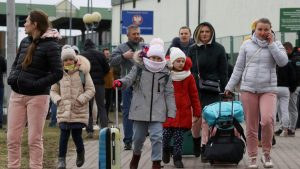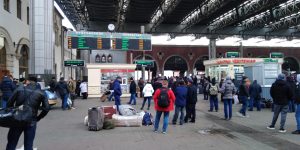As a result of Russian attempt to change the borders in Europe, we witness the biggest flow of refugees since the WWII. The UN Secratary General has launched a 1.7 billion USD appeal to provide emergency assistance to Ukraine. Already today, March 2, almost 680 000 persons have fled Ukraine since the beginning of Russia´s invasion. The UNCHR is working with Ukraine´s neighboring countries and appealing to them to let refugess cross their borders freely. However, the flow of people has made the journey for many an arduous and hazardous one. We hear of eyewitness reports on families having to split to make it across the border and the rule of the strongest at borders. This indicates that the EU civilian crisis management should coordinate assistance in border crossing procedures in war times.
The current flow of refugees has created a very different political response from the 2015 situation when the Russian government was suspected of benefiting from the flow of people to European countries. Yet, if the war continues for a longer period, the question arises of integration of large Ukrainian communities into their temporary or even permanent new places of residence. This alone will make it difficult for European nations to gradually put the Ukrainian war in the background as it happened after the 2014 annexation of Crimea.

Current attention is focused on the immediate and long-term economic effects on both sides of the EU-Russia border. But the war will also permanently shift the political landscape in Russia relations and sever practical connections between communities and organizations. This three decades long cross-border collaboration has been important for wider European security. Collaboration in various areas related to human security will be negatively affected – if not halted altogether. What remains to be seen is the effect on border security and international police cooperation, such as Russia’s membership in Interpol, for instance.
The ongoing conflict in Ukraine will have lasting negative impact on stability and security in Central Asia as well. All five Central Asian republics, to different degrees, are dependent on Russia in almost all spheres of life.
First of all, Russia is by far the largest (or second largest after China) trade partner of Central Asian countries. The presence of Russian business in the region is significant. While experts believe that the Western sanctions imposed on Russia will have start to have a devastating effect in the mid to long run, the decline of Russian economy will eventually negatively affect development in Central Asia. Landlocked in the middle of Asia and neighbouring the war-torn Afghanistan in the south, the five countries of the region export the vast majority of their goods, although not in large quantity, through the Russian territory. As the most of transport routes between Russia and the rest of Europe will also be closed, it is not yet clear how Central Asian countries can diversify their export routes. We will also witness a hampered economic growth, inflation and the decline in living standards.
However, the most immediate effect of the Russian invasion will be felt through Central Asian labour migration to Russia. There are more than 2 million migrant workers from Uzbekistan, close to 1.6 million from Tajikistan and above 600,000 from Kyrgyzstan in Russia. While for Uzbekistan with a population of 35 million the number of migrant workers may not be comparably high, one in six citizens from nine-million Tajikistan work in Russia. Kyrgyzstan and Tajikistan are highly dependent on remittances; earnings sent by Kyrgyz and Tajik migrant workers home constitute almost third of the gross domestic product of their respective countries. The sanctions have already tumbled the Russian ruble, cutting the value of savings and remittances of migrant workers. If the value of ruble continues to fall, there may be no reason for migrants to remain in Russia.

In the past, when Russian economy faced crises, like during the global financial crisis of 2008-2009 or following the western imposed sanctions for Russia’s annexation of Crimea in 2014 or even the recent pandemic, many migrant workers had to return home for the short period. Nevertheless, for lack of any job perspectives in their home countries, migrants gradually returned to Russia. Whether Russia will remain a hub for Central Asian migrant workers depends a lot on the resilience and resistance of Russian economy against the sanctions. As the confrontation between the West and Russia is quickly spiraling into the level of no return, it seems that the sanctions will hurt the Russian economy greatly if not in the coming months, then in the coming years. This, in turn, may make working in Russia unreasonable for migrant workers, thus blocking the pipeline of remittances greatly needed for Central Asian economies. A decline in remittances and a return of unemployed people in large numbers are likely to lead to economic and social pressures in Central Asian countries.
At the same time, Central Asian governments fear of the growing pressure by Moscow. So far, the governments have expressed cautiously neutral voices calling the both Russian and Ukrainian sides to put an end to the military conflict (Kazakhstan and Uzbekistan), sympathized with Russian actions (Kyrgyzstan) or remained silent (Tajikistan and Turkmenistan). Criticizing Russia for its invasion of Ukraine will be harder and harder for Central Asian capitals as they are bound with Russia through politico-economic (Kazakhstan and Kyrgyzstan) and military (Kazakhstan, Kyrgyzstan and Tajikistan) blocks. As Russia is getting isolated in international arena, remaining neutral for the five countries will be difficult and Moscow’s pressure on the region will only grow.
By Anna-Liisa Heusala and Sherzod Eraliev
